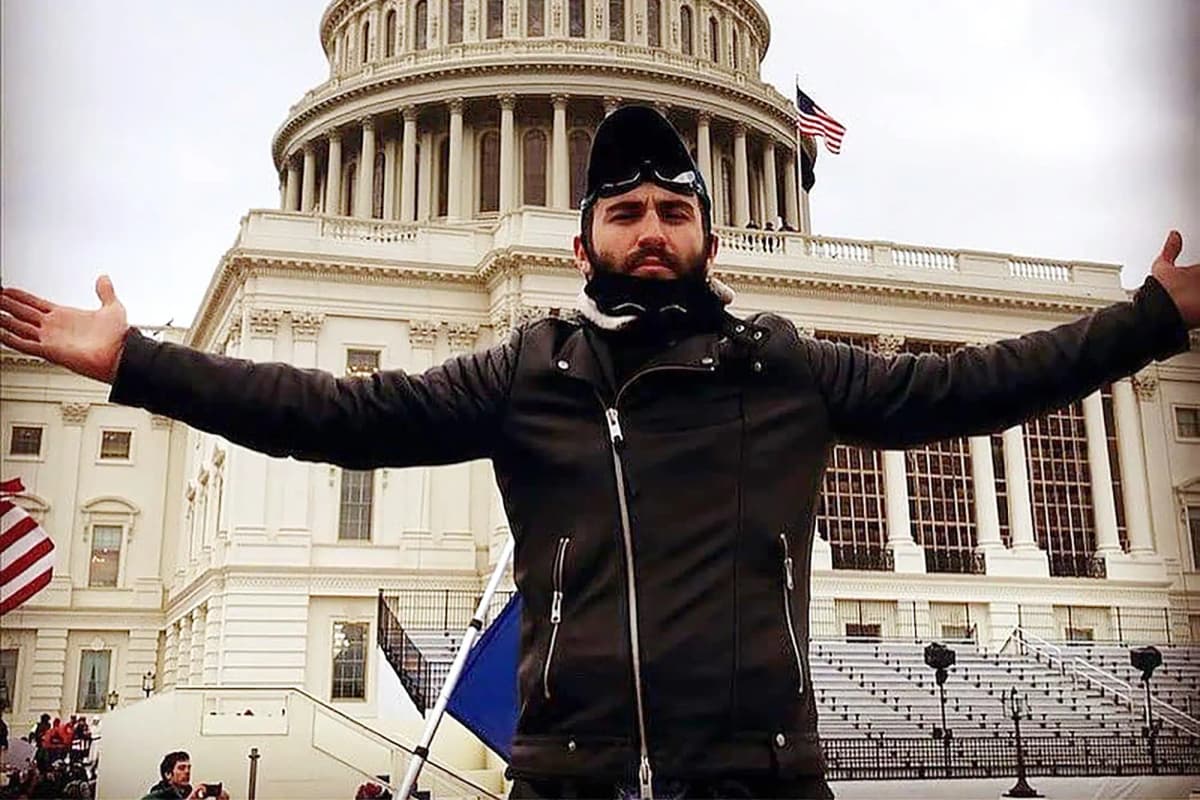From Behind Bars, January 6 Defendant Tells the Sun, ‘We Will Keep Donald Trump Out of Prison’
Edward Jacob Lang, who styles himself a ‘political prisoner,’ sees his fate tied up with that of the 45th president.

From behind bars at the District of Columbia Jail, a January 6 rioter awaiting trial on 11 criminal counts, Edward Jacob Lang, tells the Sun, “If we win this, it will clear the house” — meaning the jail — “and keep Donald Trump out of prison.”
Mr. Lang is referring to an appeal he has lodged at the Supreme Court, which he ventures “may be the most important case of the last decade.” It concerns the applicability to the mayhem of January 6, 2021, of a provision of the Sarbanes-Oxley Act, Section 1512 (c)(2) of the United States Code, meant to combat financial crime.
Mr. Lang, speaking by telephone from what he refers to as the “DC Gulag,” notes that he is the first January 6 defendant to petition the high court. He calls that provision, obstruction of an official proceeding, a “blanket political charge to persecute hundreds of protesters.” It carries a maximum prison sentence of 20 years. Mr. Lang reckons it is being used as a “tool to coerce people into taking plea deals.”
The January 6 defendant, who hails from Newburgh, tells the Sun that he was offered such a plea deal for a 10-year sentence, an offer he was given 24 hours to consider. He rejected the proposal, and now considers himself a “political prisoner” engaged in truth telling against the “weaponization” of the American law code.
In addition to that obstruction charge, Mr. Lang has been charged with various species of assault, disorderly conduct, and resisting or impeding officers with a deadly weapon. The complaint against him notes that he “joined a crowd of individuals who forcibly entered the grounds of the United States Capitol.” Mr. Lang posted to Instagram a picture of himself captioned, “1776 has commenced.”
According to the complaint, another of Mr. Lang’s posts announced, “I was the leader of Liberty today. Arrest me. You are on the wrong side of history.” The complaint details how Mr. Lang “swung, thrusted, and/or jabbed the bat at law enforcement officers multiple times.” A video posted to Twitter captures him reflecting, “The First Amendment didn’t work, we pull out the Second.”
Mr. Lang, who on the basis of that social media evidence was arrested on January 16 and indicted on January 19, notes that his trial date is now set for October after multiple delays, and reckons that he has been incarcerated for more than 900 days. His file at the Department of Justice notes, “Defendant remains committed.”
Mr. Lang’s case, though, has not been static. A jurist he refers to as “my district court judge,” Carl Nichols, threw out the obstruction charge in respect of Mr. Lang and two other similarly situated defendants, all of whom have appealed to the Supreme Court. The jurist reasoned that the law’s initial and intended purview — destroying or tampering with records — had nothing to do with the rioting at the Capitol.
Judge Nichols was reversed by a panel of the District of Columbia Circuit of the United States Court of Appeals, which held that what was interrupted at the Capitol was an official proceeding and that Judge Nichols had read the Sarbanes-Oxley provision too narrowly. The fates of more than 300 defendants facing that charge hang on that distinction.
So, too, could Mr. Trump’s future. The January 6 commission included Section 1512(c)(2) in its criminal referrals to the DOJ. While NBC reports that it was not referenced in the target letter, its flexibility of application and severity of punishment make it a potent prosecutorial tool.
Mr. Lang’s petition to the high court argues that the DOJ’s “overbroad application of the federal penal code to prosecute participants in the January 6, 2021 riot at the Capitol is the act of a behemoth unrecognized, unwarranted and unwelcome in American life.” It names the sprawling prosecutions as the “twisted dream of a slumbering tyrant.”
Mr. Lang was preceded in his challenge to using an obstruction charge liberally by Attorney General Barr, who in a 2018 memorandum to the then deputy attorney general, Rod Rosenstein, opposed the potential use of the same statute against Mr. Trump with respect to the Mueller investigation. Mr. Barr argued that would amount to “an unprecedented expansion of obstruction laws.” He became the attorney general months later.
Mr. Barr reckoned then that it “is time to travel well-worn paths; not to veer into novel, unsettled or contested areas of the law; and not to indulge the fancies by overly-zealous prosecutors.” The Supreme Court will consider Mr. Lang’s version of that argument on September 26, when it makes the decision on whether to take his case.

